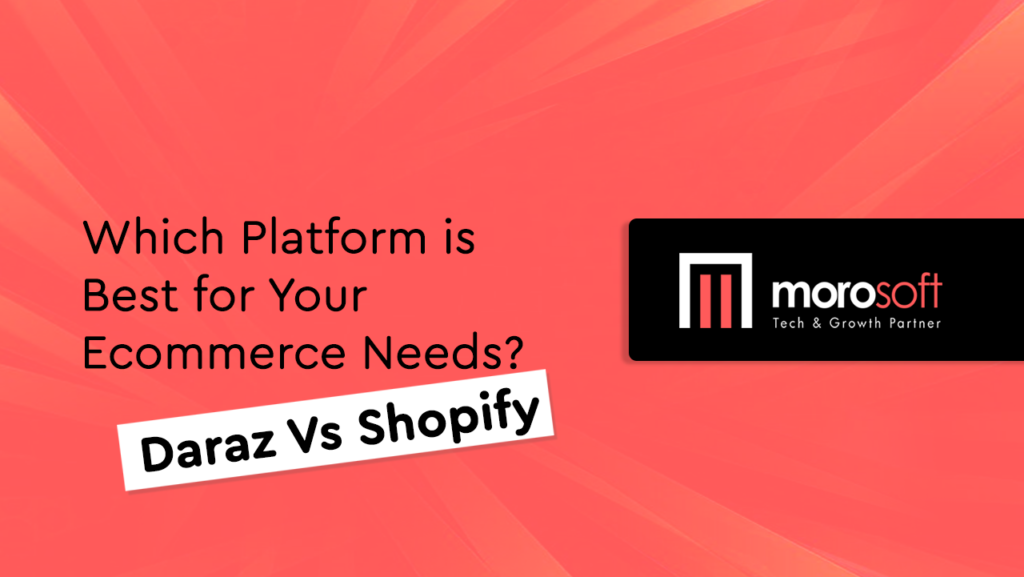In the rapidly expanding world of e-commerce, choosing the right platform to start or scale your business is crucial. Two popular options often compared are Daraz and Shopify. While both platforms are designed to help businesses sell online, they cater to different needs and offer unique features. In this article, we will dive into a detailed comparison of Daraz and Shopify to help you decide which one suits your business better.
1. Overview of Daraz and Shopify
Daraz
Daraz is an online marketplace primarily focused on Southeast Asia, particularly Pakistan, Bangladesh, Sri Lanka, Myanmar, and Nepal. It allows sellers to list products and leverage Daraz’s audience to reach potential buyers. Daraz operates similarly to Amazon or eBay, where it serves as a marketplace for businesses to sell their products without needing to manage a separate online store.
Shopify
Shopify, on the other hand, is a global e-commerce platform that allows businesses to build their own online store. It offers a full-fledged platform for entrepreneurs who want control over their branding, design, and customer experience. With Shopify, you have the flexibility to create a completely customized store from scratch and use various tools to manage every aspect of your business.
2. Key Differences
1. Control Over Your Store
- Daraz: You’re listing your products on Daraz’s platform, so the control you have over your store’s design, branding, and user experience is limited. The layout and structure are standardized, and all sellers share the same interface.
- Shopify: Shopify allows full control over your store’s design, from choosing themes to customizing product pages, fonts, and colors. With Shopify, you can establish your brand identity with no constraints. You have the freedom to design the customer journey as per your needs.
2. Target Audience
- Daraz: With Daraz, you instantly tap into a large, established audience. The platform handles traffic generation, marketing, and customer acquisition, making it easier for new sellers to find customers without needing extensive marketing knowledge.
- Shopify: With Shopify, you’re building your store from the ground up, which means you’ll need to drive your own traffic through SEO, paid ads, social media, or email marketing. Shopify offers tools for marketing, but it requires more effort on your part to generate sales.
3. Fees and Pricing
- Daraz: Daraz operates on a commission-based model, charging sellers a percentage of each sale. While there are no setup or subscription fees, Daraz takes a commission (ranging from 5% to 15%, depending on the category) from each transaction, which can add up as your sales increase.
- Shopify: Shopify charges a monthly subscription fee starting from $29 for basic plans and higher for advanced features. However, Shopify does not take a percentage of each sale (except for payment processing fees if using Shopify Payments). This flat fee allows businesses to scale without losing a portion of each sale to the platform.
4. Ease of Use
- Daraz: Daraz is relatively simple to use. You just need to create an account, upload your products, and start selling. The platform takes care of payments, customer support, and logistics, making it ideal for sellers who want a hands-off approach.
- Shopify: Shopify requires more initial setup but offers incredible flexibility. You can choose from a variety of themes, install apps for added functionality, and customize your store’s design. However, this comes with a learning curve for those unfamiliar with e-commerce store management.
5. Marketing and Customer Acquisition
- Daraz: Marketing efforts on Daraz are handled mostly by the platform. They use their resources to drive traffic to the site, meaning you don’t have to worry about customer acquisition. However, you’re competing with other sellers for attention.
- Shopify: On Shopify, you have full control over your marketing strategy. This includes SEO optimization, social media marketing, email campaigns, and even paid advertising. Shopify integrates with marketing tools like Facebook Ads and Google Analytics, giving you the flexibility to target customers more precisely.
3. Advantages of Daraz
- Instant Access to a Large Audience: Daraz provides access to a massive user base across its operating regions.
- No Setup Fees: Sellers can start with minimal upfront investment.
- Logistics and Payment Handling: Daraz handles payment gateways, customer service, and shipping, reducing the hassle for sellers.
- Simplified Seller Interface: For those without technical expertise, Daraz is easy to get started with, as it offers standardized layouts.
4. Advantages of Shopify
- Complete Control Over Your Brand: Shopify allows for full customization of your website, meaning you can differentiate your business with a unique customer experience.
- Scalability: Shopify provides advanced tools as your business grows, from third-party integrations to analytics, abandoned cart recovery, and email marketing.
- Lower Transaction Fees (Over Time): With a flat monthly fee and no per-sale commission, Shopify is more cost-effective as your sales volume grows.
- Marketing Flexibility: You can execute your own marketing strategies and control how you drive traffic and sales to your store.
5. When to Choose Daraz?
- You’re looking for a low-cost, low-effort way to start selling online.
- You prefer to focus on selling without handling marketing, customer acquisition, or logistics.
- You want to leverage an established marketplace with a ready-made customer base.
- You don’t need control over your store’s design or branding.
6. When to Choose Shopify?
- You want complete control over your online store’s design, branding, and functionality.
- You are prepared to invest time in driving your own traffic and managing customer relationships.
- You’re looking to scale your business globally and need more advanced features for growth.
- You want to avoid per-sale commissions and prefer a fixed subscription model.
7. Final Verdict: Daraz or Shopify?
The choice between Daraz and Shopify ultimately comes down to your business goals and resources. If you want to start selling quickly, without worrying about logistics, marketing, or building an audience, Daraz is an excellent choice for reaching customers in Southeast Asia.
On the other hand, if you’re looking to build a lasting, scalable e-commerce business with control over your branding and customer experience, Shopify is the better platform. Shopify provides the flexibility, tools, and support needed to grow and manage a fully customized online store.
Both platforms serve different purposes, so evaluating your business needs, budget, and long-term goals is essential before deciding.
Conclusion:
Whether you choose Daraz or Shopify, both platforms provide valuable resources to help you build a successful e-commerce business. Daraz is perfect for sellers looking for an easy, hands-off experience, while Shopify is ideal for those who want complete control and customization over their online presence. Your choice depends on the level of control you need and the effort you’re willing to invest in building your online store.
Let Us know if you need more details or another angle for the blog!




